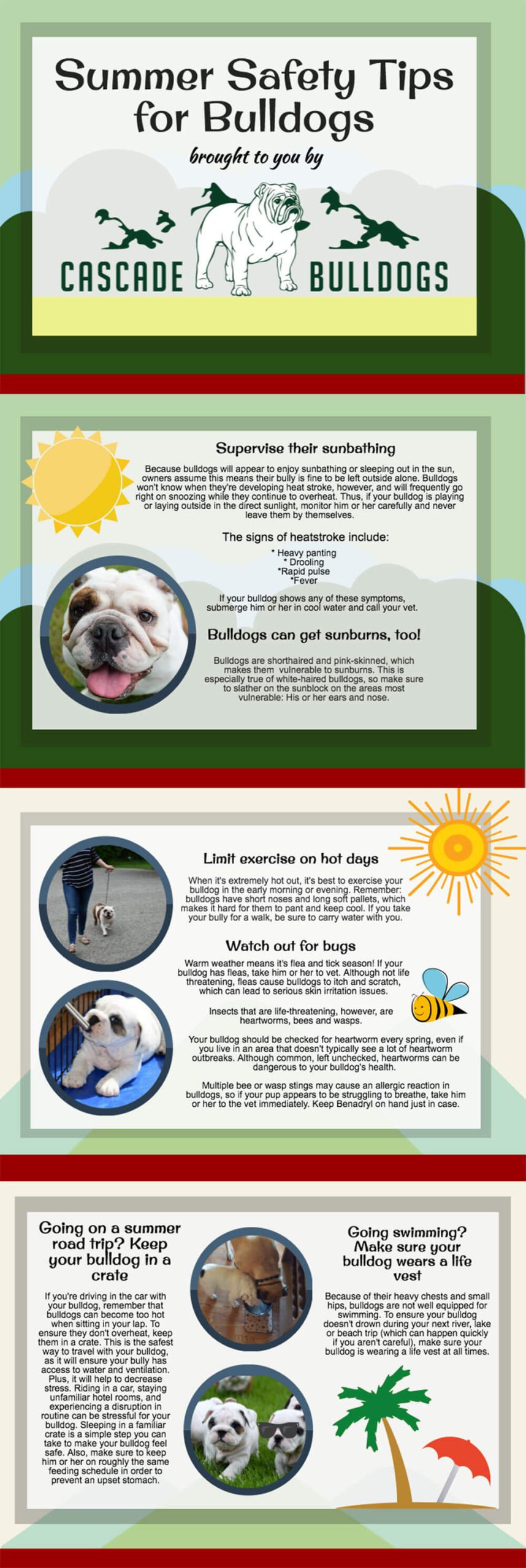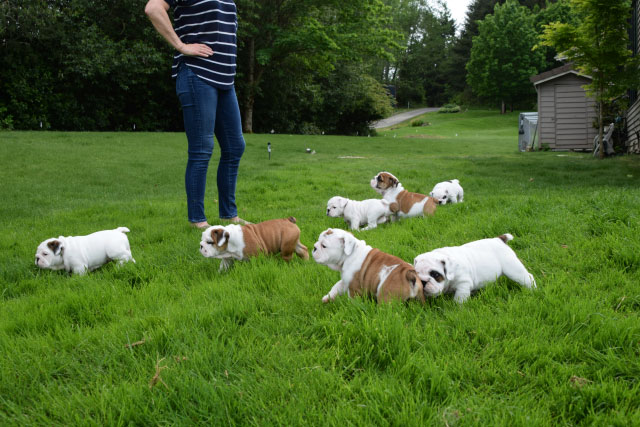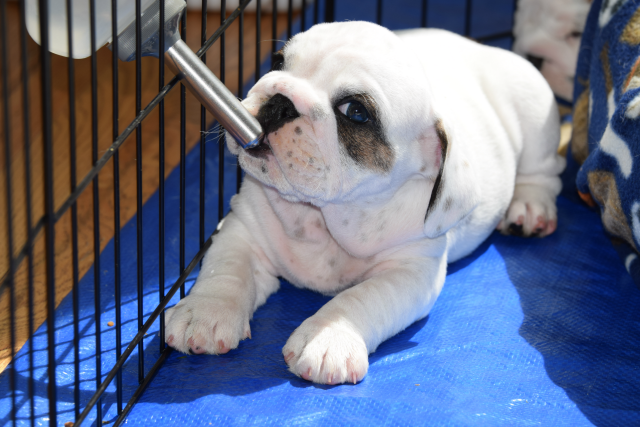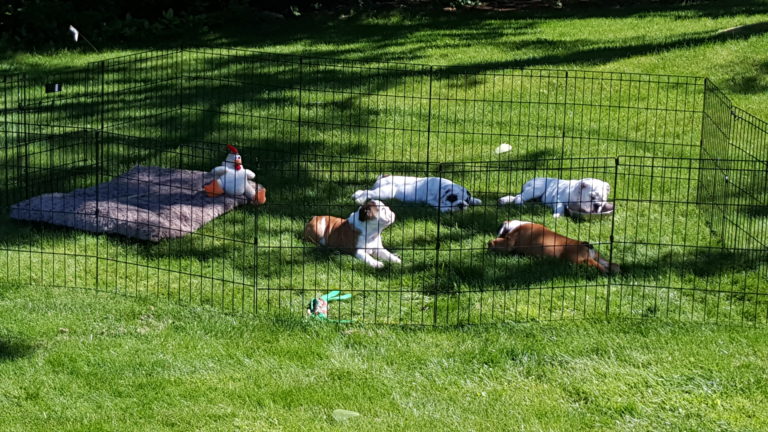Everything You Need to Know For Your Bulldog’s Big Day!
So your bulldog is going to be a mama! Congratulations. Now it’s time for the hard work! Since 90 percent of bulldogs require a Caesarean in order to deliver, it’s safe to say that you have a bulldog c-section in your horizon. Here’s a guide to what to expect and how to prepare your dog and your household for the arrival of the latest additions to your fur-baby family!
First step: Estimate when your litter is due
A bulldog will be due to whelp 63 days after she’s ovulated. You can tell when your dog is ovulating by having your vet check her progesterone levels (a bulldog will ovulate when her progesterone reaches 4 to 8 ng/dl). In order to ensure your bully doesn’t go into labor prior to your Caesarean surgery date, it’s a good idea to schedule your appointment for a day early (at 62 days after ovulation instead of 63 days). That way you won’t run the risk of making an emergency vet trip in the middle of the night! Because due date timing isn’t an exact science, however, you should start monitoring your dog closely for labor signs 48 hours before her surgery, just to be on the safe side.
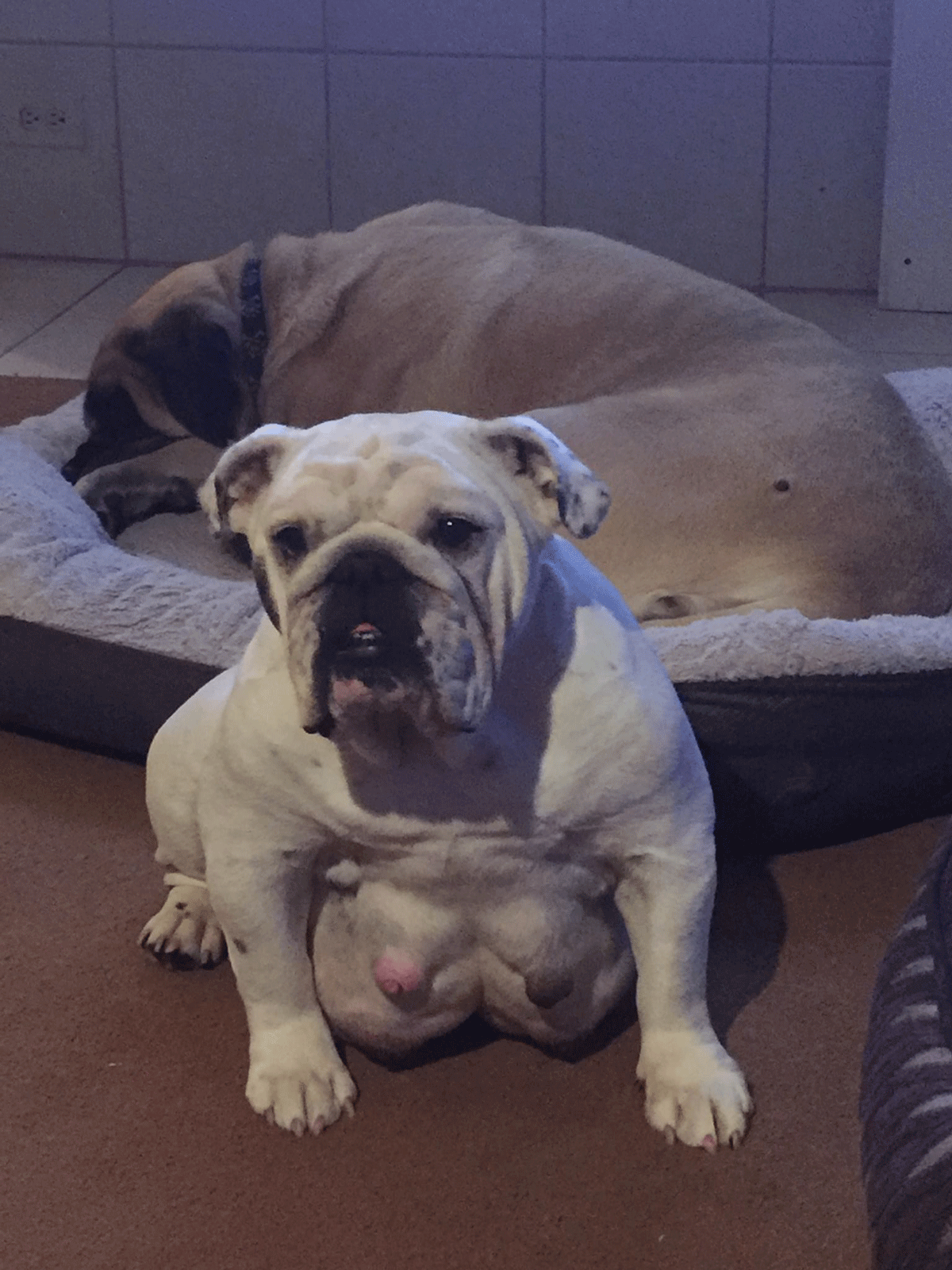
Preparing for your Bulldog C-Section: What to do before surgery
Prepare your home
Section off a quiet, warm area of your home or kennel that you can designate for your puppy nursery. Make sure you pick an area that is out of reach of children or other dogs.
Gather all the proper whelping and neonatal care supplies
Though you should ask your veterinarian for a complete list, some of the important supplies you’ll likely need will include:
- a rectal thermometer
- a room thermometer
- a heat source
- iodine for umbilical cord care
- a puppy scale
- a system for recording puppy information (the puppies’ weight, temperature and urine color, for example)
- a feeding tube
- puppy formula
- a medi-nurser baby bottle
- a dewormer
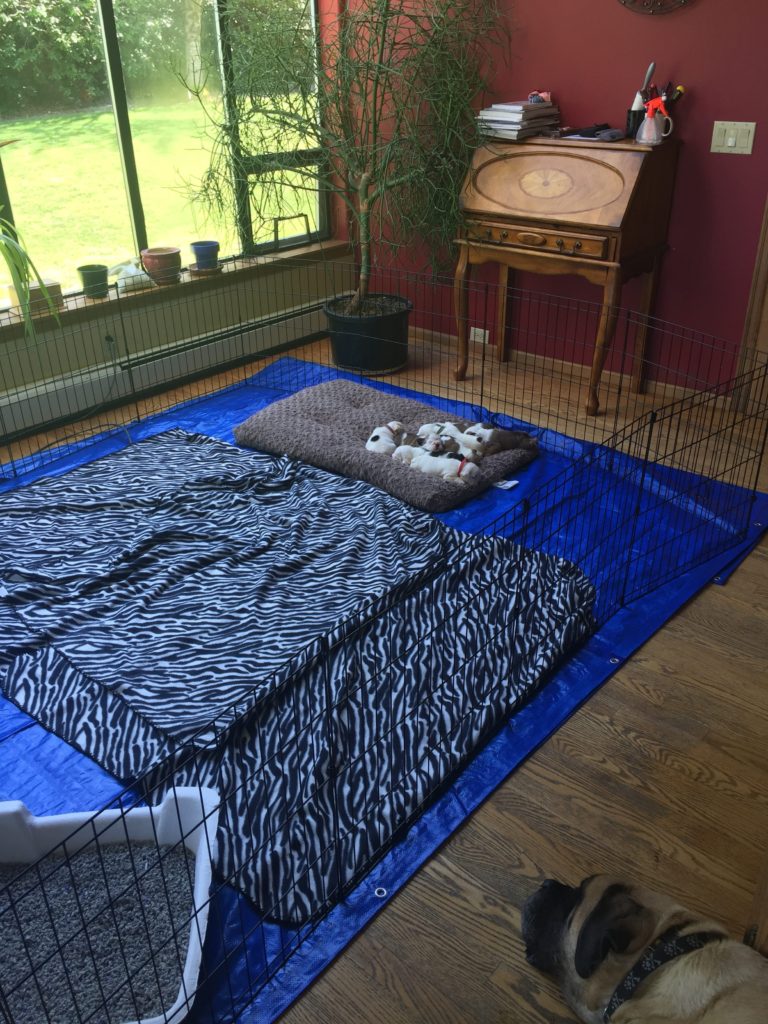
The countdown begins!
1 week prior to surgery—Avoid applying any topical flea or tick products your dog’s skin 7 days before her c-section date.
3 days prior to surgery—Veterinarians recommend that three days before your dog’s scheduled surgery, you apply an Adaptil (DAP) collar. These come in two sizes, and emit a pheromone that veterinarians believe can help with maternal skills.
2 days prior to surgery—If you feel comfortable doing so, it’s a good idea to give your bulldog a bathe so that she’ll be clean for the surgery and clean for when she starts caring for her puppies. This is also a good time to shave the part of her abdomen the veterinarians will be tending to, as this will save time the day of the surgery.
The night prior to surgery—You won’t be able to feed her the morning of the surgery, so make sure she eats a a decent-sized meal the night before!
Morning of the surgery—Again, do not feed her the morning of the surgery. The exception being if she is on any medications, then you can coat her tablets in wet food (but use as a little as possible). She may drink water the morning of her surgery, but remove her water source prior to leaving for the clinic.
What to bring to the surgery:
Here is a list of items veterinarians recommend you bring with you to the clinic the day of your bulldog c-section:
1. A tarp or tablecloth (preferably vinyl) to cover the seats or floor of the car
2. A large crate for your bulldog
3. Blankets and towels
4. Heating pad and inverter to run the heating pad
5. Plastic laundry basket to carry the puppies home in. Drape a towel across the inside.
What procedures are performed during the c-section?
Many veterinarian practices recommend you arrive to the clinic one to two hours early. Though the standard procedures may differs slightly between vet practices, here is what you can generally expect will happen during the operation:
Before the surgery:
1. First, an evaluation will be conducted to see if your bulldog is in active labor. This may involve a vaginal examination.
2. An x-ray or ultrasound may be performed
3. An IV catheter will be placed, which will require her front leg to be shaved.
4. She will be shaved for surgery
5. Blood may be drawn to test progesterone levels
6. Her tail will be wrapped so that it is kept clean.
During the surgery:
When all of the pre-op prep work is done, your bulldog will be taken to the surgery suite, where anesthesia will be administered and the c-section will take place. After the veterinary staff provide neonatal resuscitation and post-op care on the puppies, the placenta is removed, the umbilical cord is cared for and then the puppies are brought into an incubator or warming area. Ask your vet if you can assist the pups as they nurse for the first time, as this is usually done in the clinic.
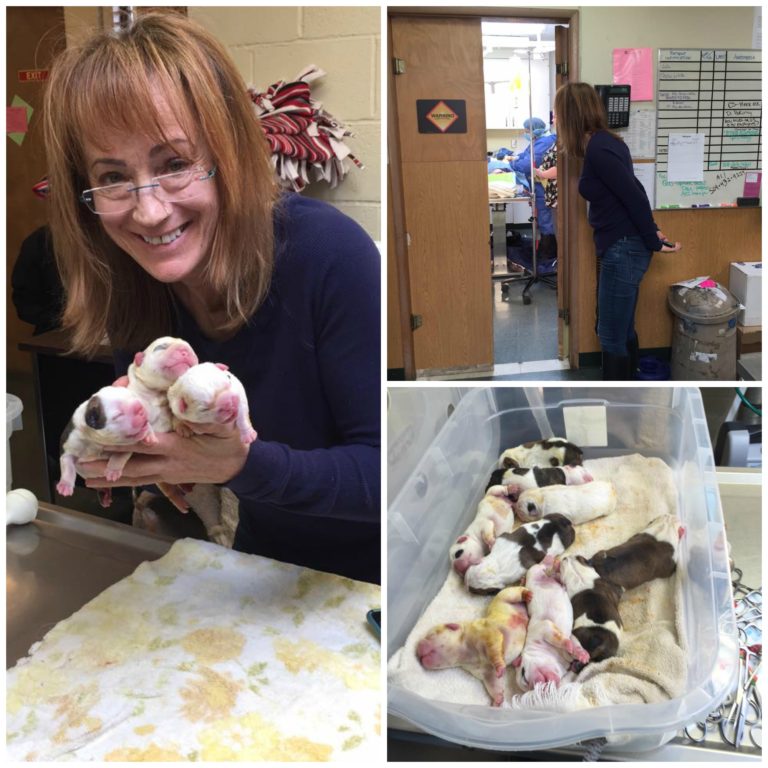
After the surgery:
You’ll be given a number of medications to take home with you, including pain medications (usually MetacamR (meloxicam) or RimadylR (carprofen) for post op pain management), Reglan/metacam (to aid in improved lactation by increasing milk production) and Oxytocin (to help with lactation).
Bringing your new puppies and happy mama home
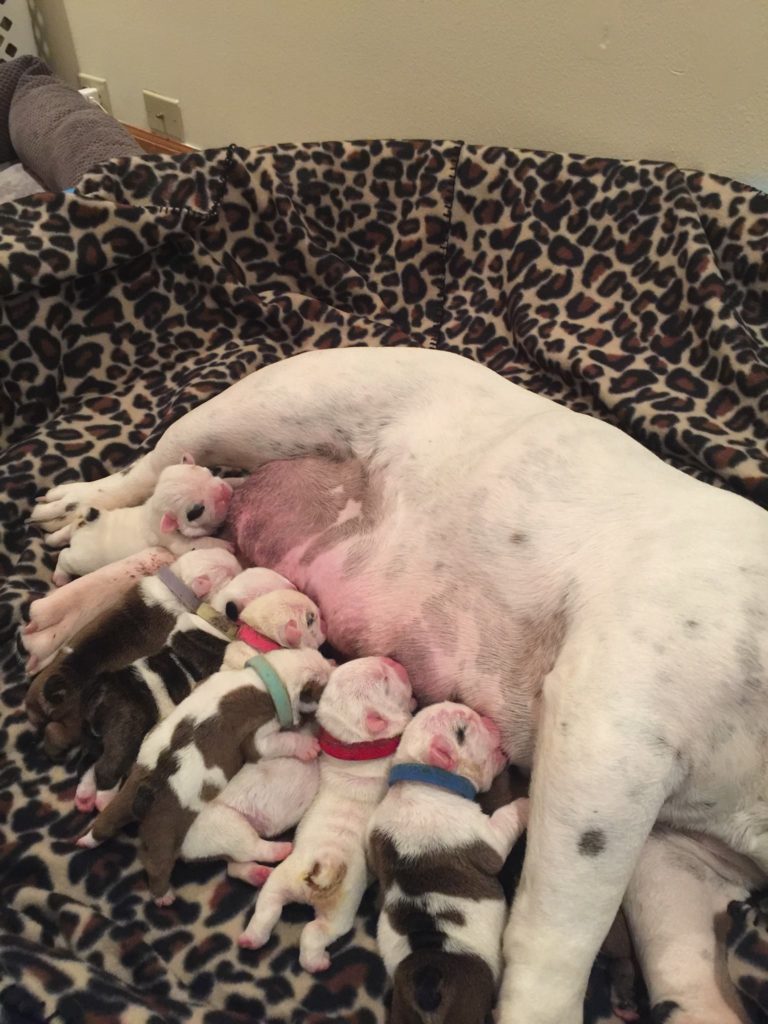
After you bring your new doggy mommy and her puppies home, you’ll need to monitor your bulldog carefully to make sure the puppies remain safe under her care. Do not leave her and the puppies unsupervised until you are sure they are safe.
Keep on the lookout for the following:
- Make sure your bulldog mommy does not lay on her puppies
- Check your puppies weight, temperatures and urine color twice each day (and record your findings) to make sure they are nursing enough and gaining weight.
- If any of your pups aren’t gaining enough weight or aren’t staying well hydrated, you may need to bottle or tube feed them.
- Check your bulldog incision, mammary glands and temperature once per day and monitor her appetite.
When to call the vet
- If any of the puppies are fussy, refusing to nurse or are not gaining an adequate amount of weight, it’s a good idea to contact your vet. Also call the vet if any of your pups have dark colored urine.
- If your bulldog has a fever higher than 103 degrees Fahrenheit or if she isn’t eating or drinking much, you shouldn’t hesitate to call your vet. Also double check with the vet if her mammary glands are swollen or if her incision looks infected.
- While it is normal for your dog to experience bloody vaginal discharge the first days, if there appears to be a lot of blood or if the discharge seems to have an odd color or odor, it’s best to play it safe and give your vet clinic a call.
What to expect at your first post-operation vet visit
When you come in for your post-op checkup, some of the procedures you can expect will include:
2, 4, 6 and 8 weeks post-op—Deworming (for both the puppies and the mom)
10 to 14 days post-op—Removal of C-section sutures
8 weeks—Health exams, health certificates for travel, microchips and first vaccinations
About Cascade Bulldogs: Cascade Bulldogs is a blog dedicated to everything you ever needed to know about raising and showing bulldogs. The site is managed by Eddie and Gail Harris, who raise and show English bulldogs in Seattle, Washington. Please follow us on Facebook for more helpful bulldog-related advice and info. You’ll also receive daily updates on our nine adorable puppies and our show dogs, Wildflower and Snow White.

